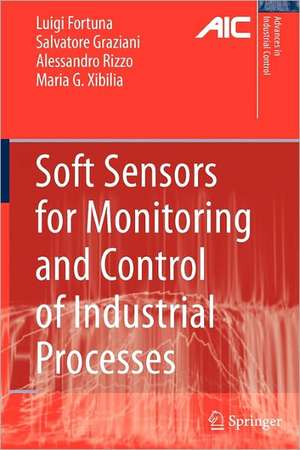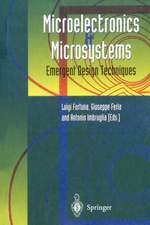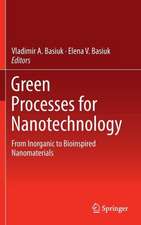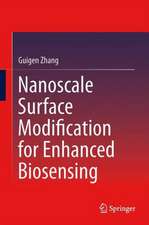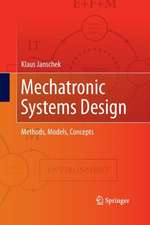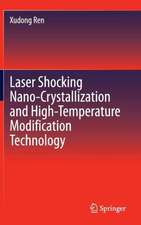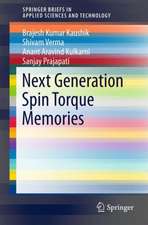Soft Sensors for Monitoring and Control of Industrial Processes: Advances in Industrial Control
Autor Luigi Fortuna, Salvatore Graziani, Alessandro Rizzo, Maria Gabriella Xibiliaen Limba Engleză Paperback – 21 oct 2010
| Toate formatele și edițiile | Preț | Express |
|---|---|---|
| Paperback (1) | 1107.73 lei 6-8 săpt. | |
| SPRINGER LONDON – 21 oct 2010 | 1107.73 lei 6-8 săpt. | |
| Hardback (1) | 1113.71 lei 6-8 săpt. | |
| SPRINGER LONDON – 7 dec 2006 | 1113.71 lei 6-8 săpt. |
Din seria Advances in Industrial Control
- 15%
 Preț: 643.34 lei
Preț: 643.34 lei - 23%
 Preț: 582.63 lei
Preț: 582.63 lei - 18%
 Preț: 783.98 lei
Preț: 783.98 lei - 18%
 Preț: 947.35 lei
Preț: 947.35 lei - 20%
 Preț: 568.24 lei
Preț: 568.24 lei - 15%
 Preț: 643.16 lei
Preț: 643.16 lei - 18%
 Preț: 899.21 lei
Preț: 899.21 lei - 18%
 Preț: 891.33 lei
Preț: 891.33 lei - 18%
 Preț: 740.57 lei
Preț: 740.57 lei - 18%
 Preț: 961.23 lei
Preț: 961.23 lei - 18%
 Preț: 955.08 lei
Preț: 955.08 lei - 15%
 Preț: 645.28 lei
Preț: 645.28 lei - 15%
 Preț: 638.43 lei
Preț: 638.43 lei - 18%
 Preț: 901.11 lei
Preț: 901.11 lei - 18%
 Preț: 1410.94 lei
Preț: 1410.94 lei - 18%
 Preț: 728.91 lei
Preț: 728.91 lei - 20%
 Preț: 1003.77 lei
Preț: 1003.77 lei - 18%
 Preț: 947.35 lei
Preț: 947.35 lei - 15%
 Preț: 643.34 lei
Preț: 643.34 lei - 15%
 Preț: 654.30 lei
Preț: 654.30 lei - 18%
 Preț: 950.52 lei
Preț: 950.52 lei - 15%
 Preț: 644.30 lei
Preț: 644.30 lei - 18%
 Preț: 1393.09 lei
Preț: 1393.09 lei - 18%
 Preț: 950.21 lei
Preț: 950.21 lei - 18%
 Preț: 949.90 lei
Preț: 949.90 lei - 18%
 Preț: 949.42 lei
Preț: 949.42 lei - 18%
 Preț: 950.52 lei
Preț: 950.52 lei - 18%
 Preț: 1113.71 lei
Preț: 1113.71 lei - 15%
 Preț: 650.04 lei
Preț: 650.04 lei - 15%
 Preț: 644.95 lei
Preț: 644.95 lei - 18%
 Preț: 950.33 lei
Preț: 950.33 lei - 18%
 Preț: 948.61 lei
Preț: 948.61 lei - 18%
 Preț: 1112.60 lei
Preț: 1112.60 lei - 15%
 Preț: 644.63 lei
Preț: 644.63 lei - 18%
 Preț: 953.20 lei
Preț: 953.20 lei - 18%
 Preț: 945.62 lei
Preț: 945.62 lei - 15%
 Preț: 640.88 lei
Preț: 640.88 lei - 15%
 Preț: 640.88 lei
Preț: 640.88 lei - 20%
 Preț: 650.92 lei
Preț: 650.92 lei - 18%
 Preț: 1112.60 lei
Preț: 1112.60 lei - 20%
 Preț: 998.36 lei
Preț: 998.36 lei - 15%
 Preț: 643.34 lei
Preț: 643.34 lei - 18%
 Preț: 948.92 lei
Preț: 948.92 lei - 18%
 Preț: 1381.43 lei
Preț: 1381.43 lei - 15%
 Preț: 651.51 lei
Preț: 651.51 lei - 15%
 Preț: 647.08 lei
Preț: 647.08 lei - 20%
 Preț: 563.66 lei
Preț: 563.66 lei - 18%
 Preț: 998.03 lei
Preț: 998.03 lei - 18%
 Preț: 1225.79 lei
Preț: 1225.79 lei
Preț: 1107.73 lei
Preț vechi: 1350.89 lei
-18% Nou
Puncte Express: 1662
Preț estimativ în valută:
211.97€ • 221.87$ • 176.42£
211.97€ • 221.87$ • 176.42£
Carte tipărită la comandă
Livrare economică 31 martie-14 aprilie
Preluare comenzi: 021 569.72.76
Specificații
ISBN-13: 9781849966085
ISBN-10: 1849966087
Pagini: 292
Ilustrații: XVIII, 271 p.
Dimensiuni: 155 x 235 x 15 mm
Greutate: 0.41 kg
Ediția:Softcover reprint of hardcover 1st ed. 2007
Editura: SPRINGER LONDON
Colecția Springer
Seria Advances in Industrial Control
Locul publicării:London, United Kingdom
ISBN-10: 1849966087
Pagini: 292
Ilustrații: XVIII, 271 p.
Dimensiuni: 155 x 235 x 15 mm
Greutate: 0.41 kg
Ediția:Softcover reprint of hardcover 1st ed. 2007
Editura: SPRINGER LONDON
Colecția Springer
Seria Advances in Industrial Control
Locul publicării:London, United Kingdom
Public țintă
ResearchCuprins
Soft Sensors in Industrial Applications.- Virtual Instruments and Soft Sensors.- Soft Sensor Design.- Selecting Data from Plant Database.- Choice of the Model Structure.- Model Validation.- Strategies to Improve Soft Sensor Performance.- Adapting Soft Sensors to Applications.- Fault Detection, Sensor Validation and Diagnosis.
Recenzii
From the reviews:
"The monograph is devoted to design procedure of soft sensors and their applications for solving some industrial problems. … The monograph highlights the importance of using knowledge from industrial experts and from the existing industrial process literature. It is full of valuable information about the veracity of different methods. The monograph will be appreciated by the industrial control engineer for its practical insights and by the academic staff for its case-study applications."(Tadeusz Kaczorek, Zentralblatt MATH, Vol. 1136 (14), 2008)
"The monograph is devoted to design procedure of soft sensors and their applications for solving some industrial problems. … The monograph highlights the importance of using knowledge from industrial experts and from the existing industrial process literature. It is full of valuable information about the veracity of different methods. The monograph will be appreciated by the industrial control engineer for its practical insights and by the academic staff for its case-study applications."(Tadeusz Kaczorek, Zentralblatt MATH, Vol. 1136 (14), 2008)
Notă biografică
Luigi Fortuna has been Professor of System Theory at the University of Catania since 1994. He has published more than 280 technical papers and is co-author of seven books including, for Springer, Soft Computing (1-85233-308-1, 2001, 280 pp, SC) and Microelectronics and Microsystems (1-85233-499-1, 2001, 222 pp, HC). He holds several USA patents. His scientific interests include automatic control, nonlinear science and complexity, chaos, cellular neural networks with applications in bioengineering. He has been an IEEE Fellow since 2000.
Salvatore Graziani received a M.S. degree in electronic engineering and a Ph.D. in electrical engineering, both from the Università degli Studi di Catania, Italy, in 1990 and 1994, respectively. In 1990 he joined the Dipartimento di Ingegneria Elettrica, Elettrica e dei Sistemi, Università di Catania, where he is an Associate Professor of Electric and Electronic Measurement and Instrumentation. His primary research interests lie in the field of sensors and actuators, signal processing, multisensor data fusion, neural networks, and smart sensors. He has co-authored several scientific papers and one book.
Maria Gabriella Xibilia holds an M.S. degree in electronic engineering and a Ph.D. in electrical engineering, both from the Università degli Studi di Catania, Italy, in 1991 and 1995, respectively. In 1998 she joined the Dipartimento di Matematica of the Università degli Studi di Messina, where she is an Assistant Professor of Automatic Control. Her primary research interests lie in the field of process control, system identification, soft computing and fault detection. She has coauthored several scientific papers and three books.
Salvatore Graziani received a M.S. degree in electronic engineering and a Ph.D. in electrical engineering, both from the Università degli Studi di Catania, Italy, in 1990 and 1994, respectively. In 1990 he joined the Dipartimento di Ingegneria Elettrica, Elettrica e dei Sistemi, Università di Catania, where he is an Associate Professor of Electric and Electronic Measurement and Instrumentation. His primary research interests lie in the field of sensors and actuators, signal processing, multisensor data fusion, neural networks, and smart sensors. He has co-authored several scientific papers and one book.
Maria Gabriella Xibilia holds an M.S. degree in electronic engineering and a Ph.D. in electrical engineering, both from the Università degli Studi di Catania, Italy, in 1991 and 1995, respectively. In 1998 she joined the Dipartimento di Matematica of the Università degli Studi di Messina, where she is an Assistant Professor of Automatic Control. Her primary research interests lie in the field of process control, system identification, soft computing and fault detection. She has coauthored several scientific papers and three books.
Textul de pe ultima copertă
Soft sensors are inferential estimators, drawing conclusions from process observations when hardware sensors are unavailable or unsuitable; they have an important auxiliary role in sensor validation when performance declines through senescence or fault accumulation.
The non-linear behaviour exhibited by many industrial processes can be usefully modelled with the techniques of computational intelligence: neural networks; fuzzy systems and nonlinear partial least squares.
Soft Sensors for Monitoring and Control of Industrial Processes underlines the real usefulness of each approach and the sensitivity of the individual steps in soft-sensor design to the choice of one or the other. Design paths are suggested and readers shown how to evaluate the effects of their choices. All the case studies reported, resulting from collaborations between the authors and a number of industrial partners, raised challenging soft-sensor-design problems. The applications of soft sensors presented in this volume are designed to cope with the whole range from measuring system backup and what-if analysis through real-time prediction for plant control to sensor diagnosis and validation. Some of the soft sensors developed here are implemented on-line at industrial plants.
Features:
• soft-sensor design;
• advice on data selection and choice of model structure;
• model validation;
• strategies for the improvement of soft-sensor performance;
• uses of soft sensors in fault detection and sensor validation;
• soft sensors in use in industrial applications such as a debutanizer column and a sulfur recovery unit.
This monograph guides interested readers – researchers, graduate students and industrial process technologists – through the design of their own soft sensors. It is self-contained with full references and appraisal of existing literature and data sets for some of the case studies canbe downloaded from springer.com.
Advances in Industrial Control aims to report and encourage the transfer of technology in control engineering. The rapid development of control technology has an impact on all areas of the control discipline. The series offers an opportunity for researchers to present an extended exposition of new work in all aspects of industrial control.
The non-linear behaviour exhibited by many industrial processes can be usefully modelled with the techniques of computational intelligence: neural networks; fuzzy systems and nonlinear partial least squares.
Soft Sensors for Monitoring and Control of Industrial Processes underlines the real usefulness of each approach and the sensitivity of the individual steps in soft-sensor design to the choice of one or the other. Design paths are suggested and readers shown how to evaluate the effects of their choices. All the case studies reported, resulting from collaborations between the authors and a number of industrial partners, raised challenging soft-sensor-design problems. The applications of soft sensors presented in this volume are designed to cope with the whole range from measuring system backup and what-if analysis through real-time prediction for plant control to sensor diagnosis and validation. Some of the soft sensors developed here are implemented on-line at industrial plants.
Features:
• soft-sensor design;
• advice on data selection and choice of model structure;
• model validation;
• strategies for the improvement of soft-sensor performance;
• uses of soft sensors in fault detection and sensor validation;
• soft sensors in use in industrial applications such as a debutanizer column and a sulfur recovery unit.
This monograph guides interested readers – researchers, graduate students and industrial process technologists – through the design of their own soft sensors. It is self-contained with full references and appraisal of existing literature and data sets for some of the case studies canbe downloaded from springer.com.
Advances in Industrial Control aims to report and encourage the transfer of technology in control engineering. The rapid development of control technology has an impact on all areas of the control discipline. The series offers an opportunity for researchers to present an extended exposition of new work in all aspects of industrial control.
Caracteristici
Shows the reader how to make the most of routine data gathering and storage to provide a valuable back-up and double check for hardware sensors and an alternative where these are not available Integrates methods for dealing with nonlinear systems common in industrial processes Real industrial case studies backed up by data sets from actual plant show readers how to adapt the methods described to their plants Includes supplementary material: sn.pub/extras
